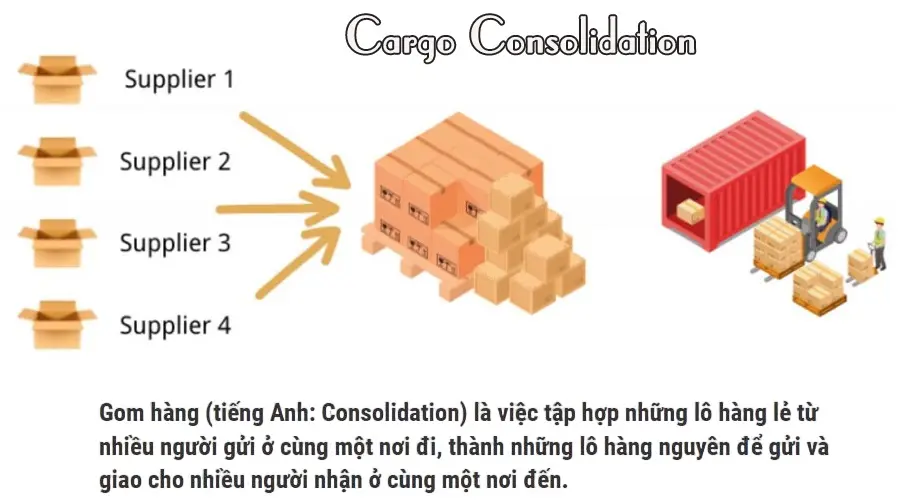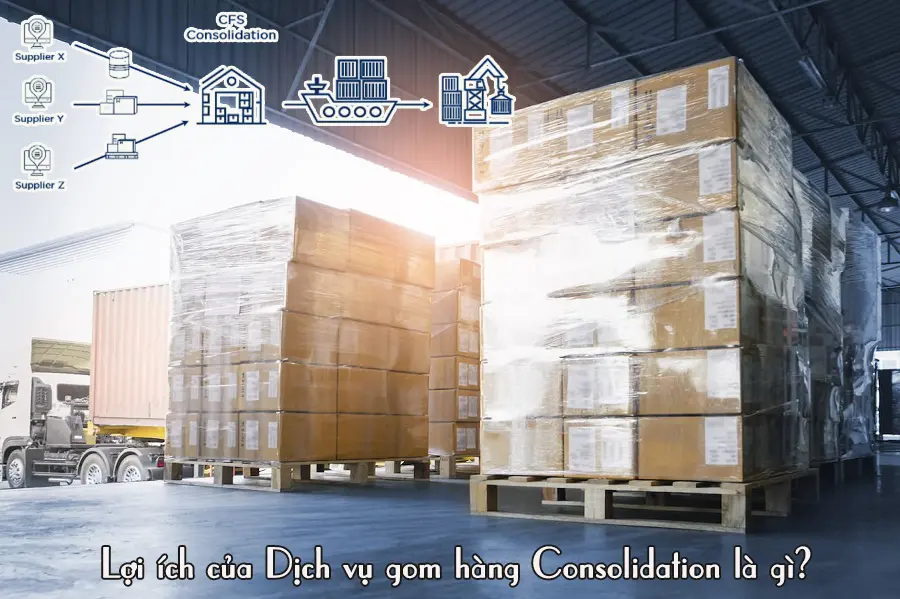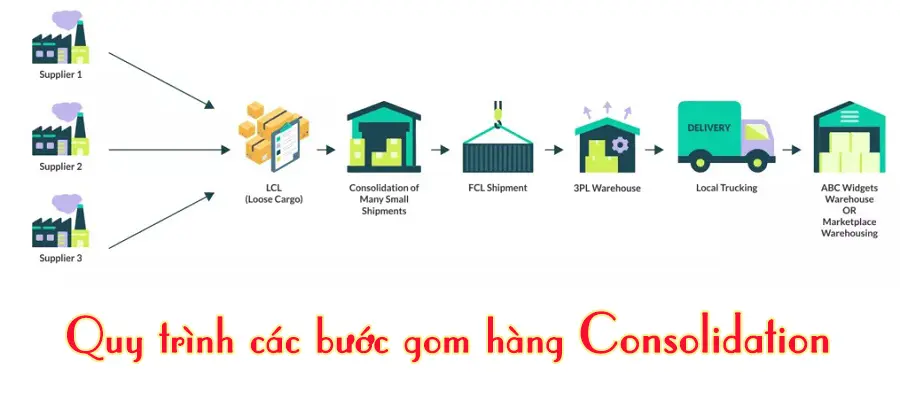x You are having a shipment, the package to transport from one location to another and need to learn about the form of consolidation of goods?
X You want to know what benefits to use the consolidation service to the parties involved?
X You have not grasped the process of conducting consolidation?
Proship.vn we will quickly answer Consolidation? What benefits does Consolidation service bring? What factors affect consolidation? How does Consolidation process are done?
Consolidation in logistics: concepts, influences and examples
Want to know what consolidation is, let's find out the concept and some of the following examples:
What is consolidation?
Consolidation is a process of gathering many small shipments from different shippers (or from many points in the same system) into a larger shipment to transport them on a container shipping , or a vehicle.

The influence of consolidation
Some influence of consolidation consolidation:
- Reduce transportation costs;
- Increase shipping efficiency;
- Increase flexibility;
- Reduce risks and limit damage;
- Optimize the use of storage space;
- Reduce environmental impact;
- Enhance the ability to negotiate prices;
- Strengthen information management and monitoring.
Examples of consolidation
Some examples of consolidation consolidation:
- Example 1: There are 50 retail shipments, 2 tons each. Retail freight (LCL) according to the shipping company is 60 USD/ton = 6,000 USD.
- Example 2: Gathering goods (delivery) is entitled to the difference: 5,000 - 3,000 = 2,000 (USD).
- Example 3: Delivery receiver from retail senders and gathered into a 100 -ton whole shipment.
Benefits of consolidation consolidation service
What is the benefit of consolidation consolidation? Consolidation benefits many parties, specifically:
Consolidation benefits with the shipper
The benefits of consolidation with the shipper:
- The depositor's charges are much lower than that of normal charges to be paid to the carrier;
- The person responsible for collecting goods will do the service of bringing "from door to door", the distribution service "Distribution" that transport companies do not do;
- The shipper is more convenient because it can be sent with a wide range but only working with a collection unit. Fast, much more convenient is to contact many transport companies themselves.
Consolidation benefits with the carrier
After the discount, the collector enjoys the differences between the total amount collected by the shipper from retail shipments. Then subtract the amount to be paid to the carrier (collecting freight).

Consolidation benefits with the service provider
The benefits of consolidation with the Gathering Service provider:
- Time, costs, papers and human resources will save a lot. Because, retail shipments do not have to settle small;
- Money from retail owners is fully collected, no loss occurs;
- Make the most of the carrying capacity delivered by the collector to the "FCL" full container.
Consolidation benefits with society and economy
The benefits of consolidation with society and the economy:
- The foreign currency going abroad is significantly reduced;
- The competitiveness in the international market increased, minimizing export costs.
Factors affecting consolidation consolidation
What are factors affecting consolidation? There are a number of factors affecting the collection of goods such as:
Consolidation - Time and priority
Collecting goods requires time to collect, check, classify and combine orders. This may affect the priority and the last delivery time.
Gathering goods requires effective planning and management to ensure that the goods are shipped on time.
Consolidation - Technical feasibility
Collecting goods may be limited by technical factors such as packaging and loading and unloading. If the order has special requirements or difficulties in packaging and loading, the process of collecting goods will be difficult/not feasible.
Consolidation - The homogeneity of goods
Effective gathering depends on the uniformity of orders. Goods have similarities in size, weight, packaging characteristics and transportation requirements will be easier to combine into a common shipment (and vice versa).
Consolidation - Cooperation, consensus between stakeholders
The collection of goods requires cooperation and consensus among stakeholders such as customers, manufacturers, suppliers and carriers.
The interaction and effective sharing of information between the parties are important to ensure that the goods can be gathered effectively and optim the shipping process.
Consolidation - Risk assessment and safety
This includes ensuring that the orders are packed, unloaded and shipped safely to avoid damage or endanger the process of collecting goods. Protection measures and safety regulations should be followed to ensure the safety of goods and related staff.
Consolidation - Transportation conditions
Factors related to transportation such as transportation, roadmap and infrastructure may also affect the process of collecting goods.
If there is a restriction on the type of transportation or the ability to handle goods, the collection may be limited or must comply with transportation constraints.
Consolidation - Legal requirements and regulations
The regulations on packaging, transportation, loading and unloading and inspection of goods should be complied with to ensure compliance with legal regulations and avoid violations.
Consolidation - A synchronization in the supply chain
Orders from different suppliers or orders from different points in the supply network should be synchronized and coordinated.
Related article: Good refrigerated container transport
The process of consolidation consolidation steps
The consolidation consolidation process is done as follows:
Step 1
Collect information on small orders: location, delivery time, type, weight, size.
Step 2
Analysis of the ability to collect goods: According to the route, the delivery point is close to each other, the type of compatible vehicle.

Step 3
Collect goods at the cross-dock or consolidation hub).
Step 4
Master shipping plan, issuance of a Master Bill and auxiliary order (House Bill) if needed.
Step 5
Monitor, delivery to each point and handling separation when arriving.
What is consolidation and related knowledge such as benefits, factors affecting consolidation, consolidation consolidation processes, ... have been fully and detailed. Businesses wishing to collect goods, transport retail goods LCL, transport whole goods FCL, ... Contact 0909 344 247 for advice and direct quotation of the services you are interested in.
